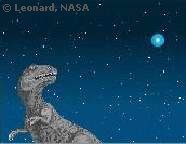Wednesday, November 29, 2006
New Study Finds that Single Impact Killed Dinosaurs

The dinosaurs, along with the majority of all other animal species on Earth, went extinct approximately 65 million years ago. Some scientists have said that the impact of a large meteorite in the Yucatan Peninsula, in what is today Mexico, caused the mass extinction, while others argue that there must have been additional meteorite impacts or other stresses around the same time.
A new study provides compelling evidence that 'one and only one impact' caused the mass extinction, according to a University of Missouri-Columbia researcher.
'The samples we found strongly support the single impact hypothesis,' said Ken MacLeod (homepage), associate professor of geological sciences at MU and lead investigator of the study. 'Our samples come from very complete, expanded sections without deposits related to large, direct effects of the impact - for example, landslides - that can shuffle the record, so we can resolve the sequence of events well. What we see is a unique layer composed of impact-related material precisely at the level of the disappearance of many species of marine plankton that were contemporaries of the youngest dinosaurs. We do not find any sedimentological or geochemical evidence for additional impacts above or below this level, as proposed in multiple impact scenarios.'
MacLeod and his co-investigators studied sediment recovered from the Demerara Rise in the Atlantic Ocean northeast of South America, about 4,500 km (approximately 2,800 miles) from the impact site on the Yucatan Peninsula. Sites closer to and farther from the impact site have been studied, but few intermediary sites such as this have been explored. [Evolution, Dinosaur, Science]
Continued at "New Study Finds that Single Impact Killed Dinosaurs"
-------
Related Geological Society of America Bulletin (GSA) paper:
Impact and extinction in remarkably complete Cretaceous-Tertiary boundary sections from Demerara Rise, tropical western North Atlantic
Kenneth G. MacLeod, Donna I. Whitney, Brian T. Huber, Christian Koeberl
Ocean Drilling Program (ODP) Leg 207, on the Demerara Rise in the western tropical North Atlantic, recovered multiple Cretaceous-Paleogene boundary sections containing an ejecta layer. Sedimentological, geochemical, and paleontological changes across the boundary closely match patterns expected for a mass extinction caused by a single impact. A normally graded, ~2-cm-thick bed of spherules that is interpreted as a primary air-fall deposit of impact ejecta occurs between sediments of the highest Cretaceous Plummerita hantkeninoides foraminiferal zone and the lowest Paleogene P0 foraminiferal zone. There are no other spherule layers in the section. In addition to extinction of Cretaceous taxa, foraminiferal abundance drops from abundant to rare across the boundary. Ir concentrations reach a maximum of ~1.5 ppb at the top of the spherule bed, and the Ir anomaly is associated with enrichment in other siderophile elements. We attribute the unusually well-preserved and relatively simple stratigraphy to the fact that Demerara Rise was close enough (~4500 km) to the Chicxulub impact site to receive ~2 cm of ejecta, yet was far enough away (and perhaps sheltered by the curve of northern South America) to have been relatively unaffected by impact-induced waves.
A recent related post:
New theory for mass extinctions (Geological Society of America)
A new theory on just what causes Earth's worst mass extinctions may help settle the endless scientific dust-up on the matter. Whether you favor meteor impacts, volcanic eruptions, cosmic rays, epidemics, or some other cause for the worst mass extinction events in Earth's history, no single cause has ever satisfied all scientists all the time for any extinction event. That may be because big extinctions aren't simple events. [More..]
Books on Dinosaurs from the Science and Evolution Bookshop: UK | US
Technorati: dinosaurs, animal, species, earth, extinct, impact, large, meteorite, yucatan, peninsular, mexico, mass extinction, missouri, columbia, macleod, geological, sciences, mu, landslides, record, sediment, demerara, rise, atlantic, ocean, south, america, site, society, odp, cretaceous, taxa, theory, mass, extinctions, dinosaur, evolution, science
Add to: CiteUlike | Connotea | Del.icio.us | Digg | Furl | Newsvine | Reddit | Yahoo